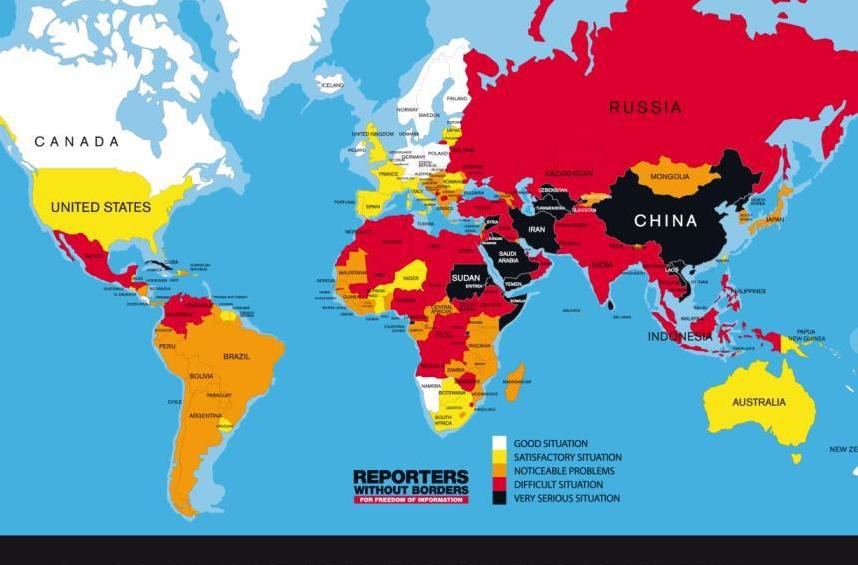Burma’s ‘democratic spring’ may be cooling down as progress towards media freedom stagnates, according to the 2014 World Press Freedom Index.
Reporters Without Borders (RWB), a France-based press monitoring organisation, publishes the annual assessment, ranking 180 nations worldwide. While under military rule, Burma’s ranking was consistently among the worst, but has risen steadily since the reform process began in 2011. Last year’s Index anticipated that the country’s consistent progress could set a good precedent for the entire region, which typically underperforms.
The 2014 report, however, emphasises Burma’s failure to live up to those expectations: the Asia chapter features an entire section on Burma, making particular note of legislative shortcomings.
“The widespread euphoria generated by the successive amnesties of political prisoners in October 2011 and January 2012 has evaporated,” it read, “With more freedom to speak out, civil society is complaining about the authorities.”
Without a proper legal framework to protect Burma’s journalists, this has proven to be extremely problematic. Last week RWB issued a public statement chastising the Burmese government for the detention of journalists associated with Unity Weekly journal, who are facing charges of violating state secrecy laws after publishing a report alleging chemical weapons production in a military-owned factory in central Burma.
Thiha Saw, editor in chief of Myanma Freedom Daily and member of Burma’s interim press council, told DVB that the government was out of bounds in its response to the allegations. Such a case requires a neutral moderator, he said, to make sure that claims of false reporting are fairly attended.
“We have asked the government and all parties to rely on the Press Council in these matters, because we are able to mediate these kinds of problems,” he said, “but this time they skipped that step.”
It’s not the first time, either. On 20 January, three Associated Press reporters were called into a state-owned publisher’s office for a chat about responsible journalism, after state media had accused them of falsely reporting events in Arakan State’s Duchira Dan [Du Char Yar Tan] village.
[related]
The original report, which details alleged atrocities committed against Rohingya Muslims in Burma’s troubled western state, was the first account of the incident to hit international media. The government’s persistent denial of both the events and access to the area has prompted a series of requests from foreign bodies to allow an independent investigation.
Benjamin Ismail, head of RWB’s Asia-Pacific Desk, told DVB on Wednesday that the initial outbreak of communal violence in June 2012 delivered a “brutal” and “unfortunate” lesson about conditions for foreign journalists in the once-closed country.
“The problem remains for foreign press,” said Ismail, “not all conditions are there for foreign press to enter and operate,” adding that the right of media professionals to access sensitive areas and report on current events is still heavily restricted.
Criticisms, however, pertain mostly to serious impediments for local media workers. As many seasoned Burmese journalists cautiously return from exile, Thiha Saw said that new media regulations, currently stuck in a parliamentary logjam, are crucial to needed advances.
“We’ve shown a lot of improvement, but we have a long way to go, and it’s really about this new legislation,” he said. “On the government side, the legislation is really about the business of media, they want to maintain that.”
Thiha Saw was referring to two bills currently under review; the contentious government-drafted Printing and Publication Enterprise Bill, and a Media Bill drafted by the interim press council, a semi-independent committee established in 2012 to oversee media reform.
“We’re not happy about the MOI [Ministry of Information] version,” he added, but said that the two bills are likely to pass within a few months.
The Index makes the same admonition: “[t]he promise to draft media legislation that complies with international standards has not been kept. Without any consultation, the government submitted a draft media law to the lower house of the parliament (the Pyidaungsu Hluttaw) on 4 March that would impose clearly unacceptable restrictions on media freedom.”
Ismael explained that when the government first attempted to approve the legislation, “what started as a miscommunication was clearly, in fact, a move by authorities not to include the media,” one that has led to a deep mistrust of the government by both the interim press council and the RSF.
Last year Burma leapt up the ranks by 18 places, but progress slowed in 2013 as the country inched up from 151st to 145th of 180 nations monitored.



